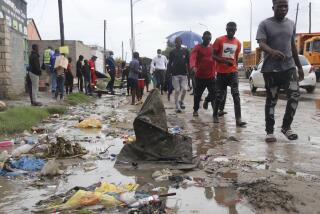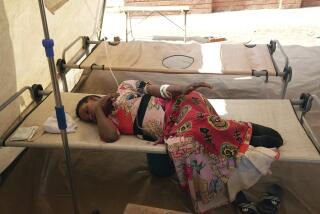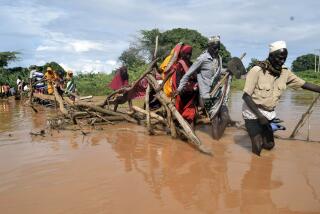Africa declared free of Ebola after more than two years of pain and heartbreak
In this Saturday, Aug. 8, 2015 photo, a man reads a monument with the names of health workers who died of Ebola at the government hospital in Kenema, eastern Sierra Leone.
More than two years after the Ebola virus erupted in a small Guinean village and tore across West African borders, killing more than 11,000 people and infecting more than 28,500, Africa on Thursday was declared free of the virus. But the World Health Organization warned of likely new outbreaks in the three West African countries worst hit by the disease.
Thursday marked 42 days since the last Liberian Ebola patient tested negative for the disease before being discharged. Neighboring Sierra Leone was declared free of the virus on Nov. 7, and Guinea was declared Ebola free on Dec. 29.
Ebola devastated families, orphaned children and killed the old and young, weak and strong alike. It left the economies of three West African countries shattered, and it exposed the deep-seated weaknesses in the nations’ health systems that saw the disease spread rapidly.
Infants, small children and the elderly were highly vulnerable to the illness – but young, strong adults, men and women, were often the most likely to be infected, carrying the sick to clinics in wheelbarrows and taxis, or caring for the sick at home.
Governments in West Africa had to convince their communities to turn away from long-held cultural beliefs: Burials for the dead had to be abandoned for cremations, which were taboo in local culture. The long-held practices of touching very ill people and touching the dead during funerals caused the virus to race through families and to jump borders as people traveled into neighboring countries for burials.
Perhaps most difficult of all, however, was that Ebola’s symptoms are so similar to other common diseases in the region, such as typhoid fever and malaria, that people often delayed seeking Ebola treatment, convinced they had a more common ailment.
Declaring the continent free of Ebola in Geneva on Thursday, the WHO said health surveillance would be crucial in months to come, with new cases likely to emerge. The virus is known to remain for months in the body, for example in semen and ocular fluid.
U.N. Secretary-General Ban Ki-moon warned Wednesday that local and international responders would need to remain vigilant. Liberia experienced two flare-ups after it was declared Ebola-free in May.
“Governments will need resources to help communities prevent infection, detect potential cases and respond rapidly and effectively,” Ban said at the United Nations in New York. “
While the potential and frequency of such flare-ups are expected to decrease over time, major challenges will remain for the countries that were hardest hit.
More than 10,000 people survived the virus, U.N. officials say. Many of them continue to suffer health problems that will need to be addressed. Some West African patients have continued to suffer weakness and aches months after being cured. Care will also need to be provided for the many widows and orphans created by the epidemic.
“And as we recognize the courageous health workers, burial teams and others, let us do all we can to counter the distress, mistrust and stigma caused by Ebola,” Ban added.
WHO Director-General Margaret Chan, who was criticized for the organization’s sluggish response to the outbreak in 2014, said in Geneva on Thursday that eliminating the disease had been a major achievement.
“Detecting and breaking every chain of transmission has been a monumental achievement,” she said.
“So much was needed and so much was accomplished by national authorities, heroic health workers, civil society, local and international organizations and generous partners. But our work is not done, and vigilance is necessary to prevent new outbreaks.”
Follow @RobynDixon_LAT for news from Africa
More to Read
Start your day right
Sign up for Essential California for news, features and recommendations from the L.A. Times and beyond in your inbox six days a week.
You may occasionally receive promotional content from the Los Angeles Times.






